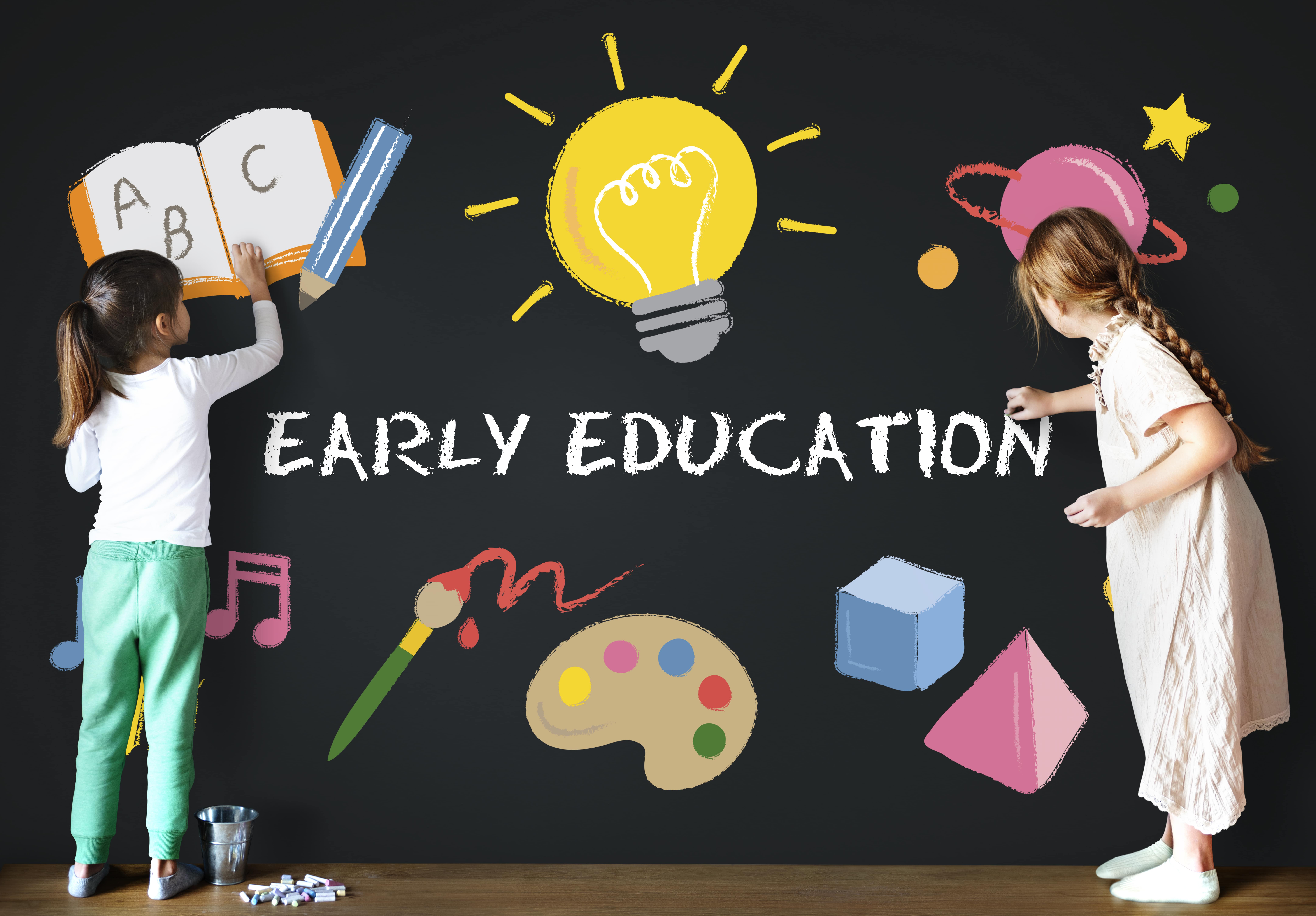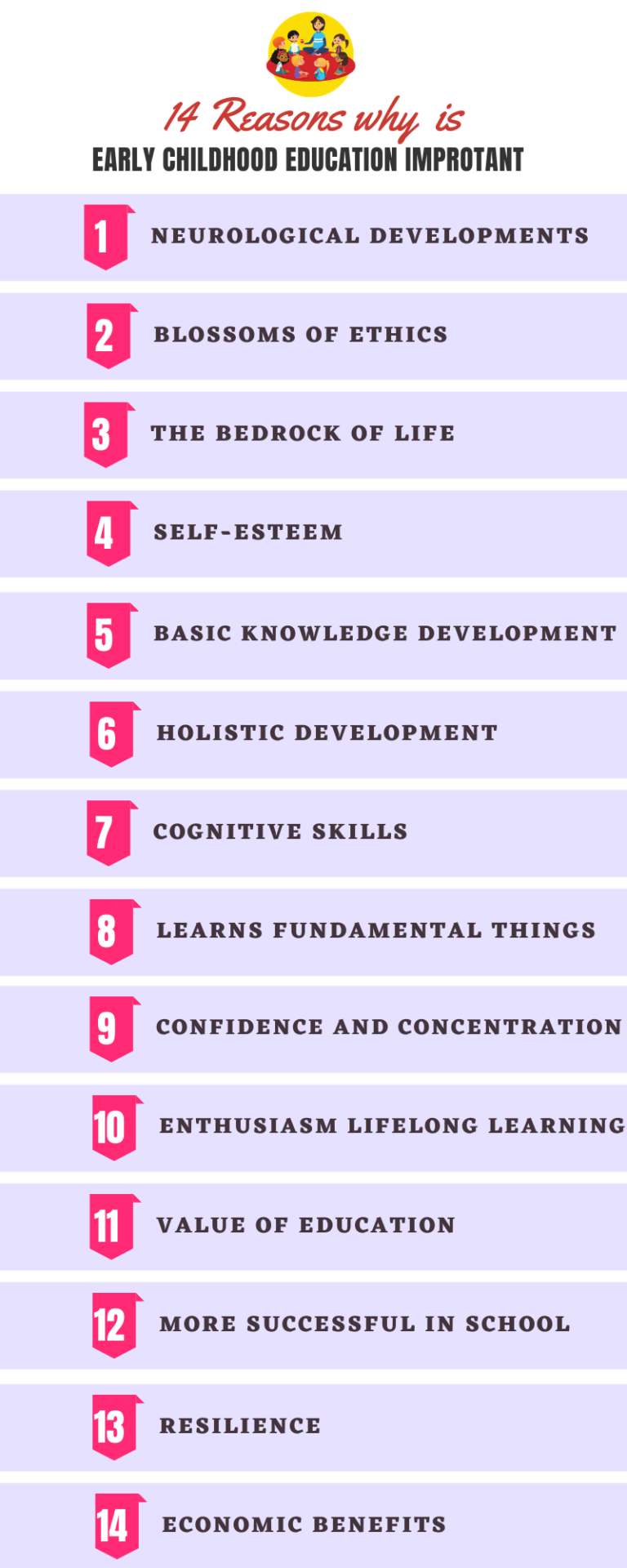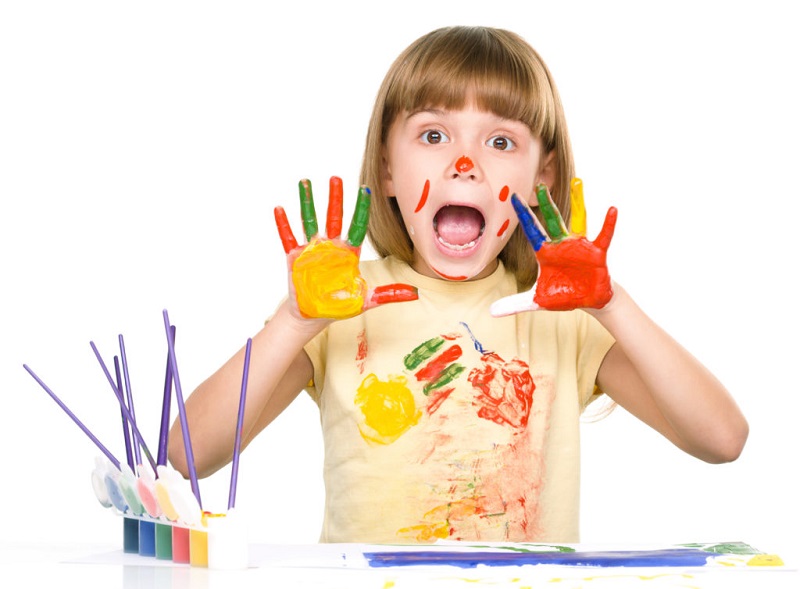We want our child to be intelligent, clever, and sharp, innit? Children are the Godsend gifts on the earth. Thus, their educational, ethical, and social developments are the priority of the family as well as the state. So, you can’t deny the benefits of childhood education, the most Importance of early childhood education.
What is Early Childhood?
If you want to distinguish the development phases of a child, you will find three broad stages
- Early Childhood (birth to 8 years)
- Middle Childhood (8 to 12 years)
- Adolescence (12 to 18 years)
Among these, early childhood is pretty much vital. This period is very crucial for a child’s physical and mental development. It is the time when the blooming of the brain and growth of a toddler is at its peak.

Concept of Early Childhood Education (ECE)
Early Childhood Education is a branch of education theory. It reflects the teaching of children both formally and informally. It is mainly for children between the ages of 3 to 5 years. People generally call it preschool, daycare, nursery education, or only early education. Most importantly the purpose of it is to prepare a kid for elementary school.
What does UNESCO say about it?
“Early childhood care are education (ECCE) concerns children from birth to age 8, from prenatal care to promote a smooth transition to primary school. It includes both in-home and out-of-home settings and can target either parents or children.”
History of ECE
Let’s get some essence of history.
ECE came into view during the Age of Enlightenment, especially in European countries. It became a norm in the western world as it was continuously growing throughout the 19th century. By this time Kindergartens and Day Nurseries were established. They were used for educational and caring purposes in most of Europe. In the past, early childhood education was somewhat informal. It was only evolving among family, households, and community members. But after the 20th century, this term was formalised and characterised as women started to join in outdoor works.
Purpose of Early Childhood Education
Many parents wonder what actually is the purpose of early childhood education. But it is the best type to educate your child. They love to play. ECE unites learning with playing. Thus, children get introduced to education in form of entertainment
Academics
Who doesn’t want their child to be academically successful? It’s the dream of every freaking parent. I can understand how much woe you have to go through to complete their desire. Or are you a nerd? Don’t worry, just kidding!
Academic success is inherent to get a green-eyed career. And proper early education plants the first seed of the tree of success. It is more than learning basic maths, science, or arts. The educators teach the children that education is real fun by using Montessori methods, Multi-Sensory experiences, or any other approaches.
Watch this video to get a vision of Cardiff Montessori School & Nursery.
Learn with diversity
Early Childhood Education provides children to learn with diversity. Children develop healthy social interaction by mixing with other kids from different cultures and backgrounds. Thus, early learning gives them positivity, self-esteem, and self-confidence.
Learn How to Promote Diversity in Early Years in our latest publish.

14 Reasons why is early childhood education improtant
We all know that learning begins from our very first cry, from the moment of our birth. And the early years of a child are the most important years for their physical and internal development.
Now, let’s list some importance of early childhood education.

1. Neurological Developments
Early childhood is a critical time for brain development. In this phase, neurons are organised to form complex brain functions. And these functions are essential as they set up patterns of behavioural and emotional operations for future stages of life. So, improper or absence of early childhood education may hinder this development.
For making your child even smarter, you need to provide early education.
2. Blossoms of Ethics
This is the stage where your offspring starts to bloom as an ethical person. Early childhood education helps him/her to learn how to respect senior citizens, how to differentiate between right and wrong, etc. This is the time when they learn lying is wrong and highly prohibited.
Early childhood education will assist your kid to become an adorable good-hearted person, not a brat!
3. The Bedrock of Life
Educational experiences during this period work as grounding knowledge. It creates a link between early abilities and future achievement. And early childhood education helps a child in making crystal clear insight about the future life.
4. Self-esteem
Self-esteem is an important virtue for a child. It is better nurtured outside the home environment. For this, preschool or nursery is the best option.
The instructors teach your child how to respond in peer pressure, make healthy choices, etc. And their energy level and attitude also come to light more vividly. Thus, your child’s self-esteem will flash more in a better way.
You may also read now: 10 Reasons to Become a Nursery Teacher
5. Basic knowledge development
Knowledge is an asset to a person’s life. Thus, the importance of children’s knowledge is beyond question. Children with strong basics show potential in oral language and reading comprehension skills, critical reasoning, and learning across academic content domains.
Research has found that providing children with a strong foundation of content knowledge is crucial for three reasons.
- Knowledge is both cumulative and exponential
- Knowledge helps scaffold the encoding and retrieval of new information
- Knowledge facilitates critical thinking
6. Holistic Development
Fostering a child’s social, physical, psychological, and emotional needs is damn important. It is key to the learning path. Holistic development takes into account the gross build-outs of an infant with its surroundings.
The holistic approach of ECE can make a balance between the home, the environment, and the growing child.
7. Cognitive skills
It involves the progressive building of learning skills, like attention, memory, and thinking. So these skills help children to learn to evaluate, analyse, remember, comparisons, and understand cause and effect.
8. Learns fundamental things
Basic subjective learnings are started from the very beginning of our life. A child learns ABCD of any subject through rhymes, acts, and stories like fairy tales. These fundamental teachings make them more realistic, more clever, and intelligent.
Early childhood education provides a comfortable environment for these little souls. It brings curiosity among them about learning.

9. Confidence and Concentration
You can conquer anything in the world with your confidence and the ability of concentration makes it even smoother. Early childhood education lends a hand in building your child’s confidence. It vanishes his/her shyness. By and by, your offspring will have the gift of the gab.
10. Enthusiasm Lifelong Learning
“Education” a basic need of our life. Without it there is no future, no value of life. But sometimes we pay less attention to our education and as a result, we live with tragedy ever after with guilt.
So, you don’t want your child to be the same, aren’t you? Give your child early education to build the value of education inside him. Don’t let him ruin his life by regretting it.
11. Value of Education
“Education” a basic need of our life. Without it there is no future, no value of life. But sometimes we pay less attention to our education and as a result, we live with tragedy ever after with guilt.
So, you don’t want your child to be the same, aren’t you? Give your child early education to build the value of education inside him. Don’t let him ruin his life by regretting it.
12. More Successful in School
Early education helps in a child’s early development. Children who get proper care at an early age display wonderful performance in school. This leads towards a successful career, hence a well-to-do future.
13. Resilience
Early childhood educators and parents try to build elasticity in a child at an early age. A teacher’s responsibility is to create a challenging environment where children can learn through first-hand experiences. Early education is the foundation for building coping strategies for greater challenges in life.
Read More:
1. 10 Ways Parents Can Get Involved in Child’s Education
2. How To Become A Brilliant Childminder: Get a Head Start on Success
3. Working With Autistic Children: A Complete Career Guide
4. Communication Skills for Children: Importance, Activities & Games
14. Economic Benefits in form of Education Benefits
Don’t get confused about the headline! Let me explain first.
Researchers found that high-quality early childhood education programs lead to income gains of 1/3 to 3.5% each year when the children become adults. It’s surprising, I know right?
Also, sending the child to an early childhood education centre creates a scope for a mom to work outdoors. This increases family income and benefits the state’s economy as a roundabout. EUREKA!!
Wait, do you notice that I give 14 points instead of 13? Well, I don’t want to be an unlucky fella!
Concluding Remarks
Do you know Fortingall Yew? It’s Great Britain’s oldest tree. People say the tree is more than 2000 years old. Well, you must be thinking that what’s the point here.
Take your child as the tree and his/her lifelong achievements as its leaves. The tree won’t be standing this long if the root is not strong enough. And in concern of your child, the root is early childhood education. Make the root stronger for the development of your offspring. Because early childhood matters!
Read more
- How to Promote Diversity in Early Years (Learn the Secrets)
- How to Become Good at Math Overnight (is it Really Possible?)
- Safeguarding Responsibilities in Schools: Challenges and Solutions
- How Old Must You Be to Buy Paracetamol
- The Health and Social Care: Stress-Free Service Guide
- What are Functional Skills? From Theory to Practice
- 6 Secrets of How to Become a Baker in 2025 (Career Guide)
- Modal in Maths: Mode, Mean, and More Explained!
- How to Support People with Learning Disabilities?
- What Are the 21 Basic Computer Skills You Must Have in 2025


 May 10, 2023
May 10, 2023
















